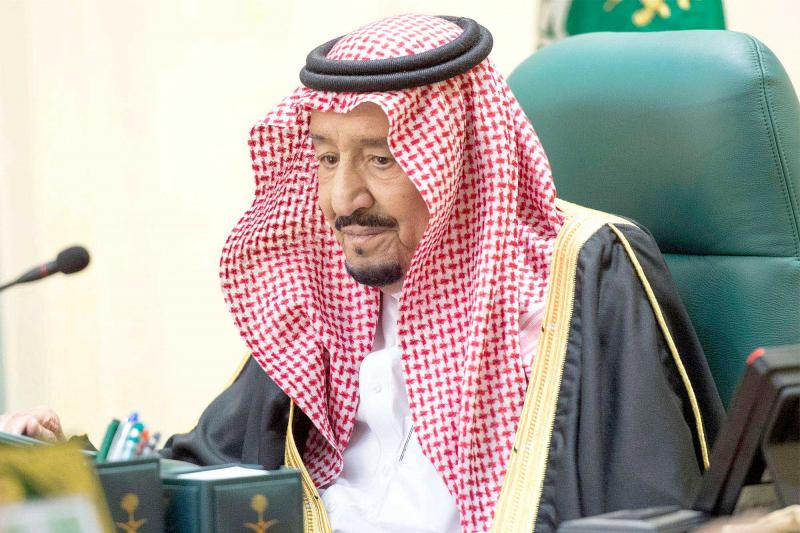
Firm stance. Saudi King Salman bin Abdulaziz Al Saud during a cabinet meeting, on November 20. (SPA)
What should we make of Saudi King Salman bin Abdulaziz Al Saud’s reiteration of the centrality of the Palestinian issue to his country’s view of the region and the world?
The king delivered the reassurance in his remarks to the Shura Council on November 19. The annual monarchical address to the council is meant to outline the kingdom’s priorities for the coming year. So, this much can at least be said: For the next year, so long as King Salman is on the throne, Saudi Arabia will continue to publicly reaffirm sympathy for the Palestinian cause.
Never mind the quibbling over the rhetorical or real nature of Saudi support for the Palestinians. King Salman’s words are important simply because he said them — and said them at this particular moment in time.
Palestinian refugees currently face an existential crisis like nothing before in their history. They face the prospect of being stripped of refugee status even though there is no imminent, satisfactory settlement available to them and no way they can go home and leave their place of temporary refuge, whether in Lebanon, Jordan, Syria or anywhere else. Wherever they are, Palestinians continue to live with the reality described as follows by the late poet Mahmoud Darwish: “The Nakba is not a memory; it is a continuous uprooting that makes Palestinians more worried about their existence.”
But the Trump administration is seeking to delegitimise Palestinians’ status as refugees, which is to say a continuously uprooted people, still displaced from their home. It is doing this by refusing to fund the UN Relief and Works Agency for Palestine Refugees in the Near East (UNRWA), which is relied upon by 5 million people for basic services such as health care and education.
UNRWA’s money troubles (though it has now made up most of the shortfall) obviously affect Palestinians where it really hurts — how they live, how well they live and how they raise their families. But US displeasure with UNRWA cannot only be reckoned up in dollars and cents. Donald Trump’s America is trying to cast doubt on received wisdom and the hitherto internationally accepted definition of who is a Palestinian refugee. Is UNRWA’s 5-million-strong flock correctly described as refugees or should that status be restricted to the roughly 700,000 people who fled British Mandate Palestine?
The question is complex, emotional and potentially game changing. If there are 5 million Palestinian refugees today, it’s because successive generations of Palestinians descended from the original 700,000 who fled British Palestine continue to remain displaced. That they were not born or bred in Palestine does not mean they are not refugees from their ancestral homeland. If the new Trumpian idea of Palestinian refugee status were to apply, it would summarily revoke the only identity these people have ever validly, truly and always held.
This is, as Darwish said in 2008 from his deathbed, a matter of a “tormented soul with daily questions; both national and existential… Being Palestinian is not a motto, nor is it a profession.” Indeed, as India’s first prime minister, Jawaharlal Nehru, once described the flawed moral argument for Israel: “Palestine was not a wilderness, or an empty, uninhabited place. It was already somebody else’s home.” It is that home from which the Palestinian refugee is sundered, no matter if he or she was born elsewhere.
The other game-changing aspect of restricting Palestinian refugee status revolves around numbers. In 2018, some — or many — of the original 700,000 refugees can reasonably be expected to have passed. The Nakba, after all, occurred in 1948. If only a dwindling number of people will now be defined as Palestinian refugees, the issues of right to return, self-determination and statehood start to pale. In this context, King Salman’s robust assertion of Saudi support for Palestinians offers moral and political ballast to a careening movement.
Finally, of course, King Salman’s stated solidarity with Palestinians comes amid fresh speculation that the Trump peace “deal of the century” is about to be unveiled. That the deal, if and when it appears, will be weighted in favour of Israel is a given. That the Saudis will not tamely go along is clear. Words matter. King Salman’s more than anything anyone else says right now.

